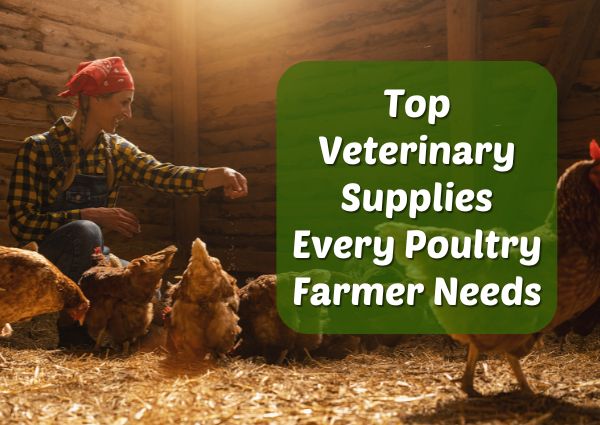1. Vaccines
Vaccination is one of the most effective ways to prevent disease in poultry. A proper vaccination schedule can protect your birds from common illnesses such as Newcastle disease, avian influenza, and Marek’s disease. Vaccines come in various forms, including live, inactivated, and recombinant types. Consult with your veterinarian to develop a vaccination program tailored to your flock’s specific needs and local disease risks.
2. Antibiotics
Antibiotics are crucial for treating bacterial infections in poultry. While responsible use is essential to prevent antibiotic resistance, having a supply of approved antibiotics on hand can be a lifesaver during health crises. Familiarize yourself with the common bacterial diseases that affect your birds and consult with your veterinarian to select the right antibiotics for your flock.
3. Electrolytes And Nutritional Supplements
Stressful situations, such as heat stress, illness, or transportation, can lead to dehydration and nutritional deficiencies in poultry. Electrolyte solutions help restore hydration and balance essential minerals, while nutritional supplements provide extra vitamins and minerals to support overall health. Keep a stock of these supplies to ensure your birds recover quickly and maintain their productivity.
4. Insect And Parasite Control Products
Pests and parasites can wreak havoc on poultry health. From internal parasites like worms to external pests like mites and lice, having an effective pest control plan is vital. Invest in products such as dewormers, insecticides, and sprays to keep your flock free from harmful parasites. Regularly monitor your birds for signs of infestations, and treat promptly to minimize the impact on their health.
5. First Aid Supplies
Just like any other livestock, poultry can suffer from injuries or sudden health issues. A well-stocked first aid kit is essential for any poultry farmer. Your kit should include:
- Antiseptic solutions: To clean wounds and prevent infections.
- Bandages and gauze: For dressing wounds.
- Syringes and needles: For delivering vaccines or prescription drugs.
- Thermometer: To monitor body temperature and detect fever.
Having these supplies readily available allows you to respond quickly to emergencies and can significantly improve your birds’ chances of recovery.
6. Brooders And Heating Equipment
Proper temperature regulation is crucial for the health of young chicks. Brooders and heating lamps create a warm, comfortable environment that helps chicks thrive during their early stages of life. Invest in reliable brooding equipment and monitor temperature regularly to ensure your chicks receive the optimal conditions for growth and development.
7. Feeding And Watering Equipment
Access to clean water and balanced nutrition is vital for poultry health. Invest in high-quality feeding and watering systems that minimize waste and keep your birds hydrated and nourished. Regularly clean and maintain these systems to prevent the spread of disease.
8. Record-Keeping Tools
Maintaining accurate health records is essential for any poultry operation. Consider using digital tools or notebooks to track vaccination schedules, health issues, treatment protocols, and flock performance. This information is invaluable for making informed decisions about your flock’s health and management.

